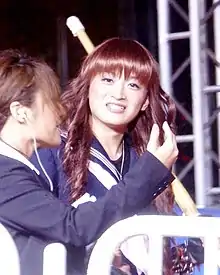Otokonoko
Otokonoko (男の娘, "male daughter" or "male girl", also pronounced as otoko no musume) is a Japanese term for men who adopt a culturally feminine gender expression,[1][2][3][4] usually through cross-dressing or crossplay. Otokonoko is a play on the word 男の子 ("boy", from male + child), which is also pronounced otokonoko; in the slang term, the kanji for child (子) is substituted with daughter/girl (娘).

| Cross-dressing |
|---|
The term originated in Japanese manga[4] and Internet culture in the 2000s, but the concept reflects a broad range of earlier traditions and examples of male cross dressing in Japan, such as onnagata in kabuki theater and in the career of cross-dressing entertainer Akihiro Miwa. Its popularity increased around 2009, with the rise of dedicated maid cafés, fashion stores, cosmetic products, and a range of popular media in the otaku culture.[2][5] It is often combined with the cosplay of female fictional characters by men (crossplay).[1]
By extension, otokonoko is also a genre of media and fiction about feminine looking / dressing men, aimed at a male audience. It is part of the spectrum of shōnen entertainment (targeted at young boys) and seinen entertainment (targeted at young men) and often contains erotic or romantic elements. Otokonoko characters have also begun to appear in mainstream Japanese popular entertainment such as manga, anime, and video games.[1]
Related terms
The female equivalent of Otokonoko, girls wearing male clothes, is called dansou (男装).[6]
Otokonoko characters are referred to by English-speaking anime fans as "traps".[7]
References
- Ashcraft, Brian (26 May 2011). "What Is Japan's Fetish This Week? Male Daughters". Kotaku. Retrieved 5 January 2014.
- Clegg, Cara (7 June 2014). "Japan slowly begins to openly discuss crossdressing men in heterosexual relationships". SoraNews24. Retrieved 14 March 2018.
- "業界用語集". Newmo (in Japanese). Retrieved 7 January 2020.
- "OTOKONOKO : DES GARÇONS TROP MIGNONNES". Vice. 8 August 2013. Retrieved 5 January 2014.
- 森友, ひい子 (2 June 2014). "「男の娘」「女装子」と呼ばれる人々 "中性化受け入れ"円満な夫婦の鍵 〈週刊朝日〉". AERA dot. (アエラドット) (in Japanese). Retrieved 14 March 2018.
- Anime, Japanese with. "josou 女装".
- "josou 女装". Japanese with Anime. Retrieved 2020-11-04.